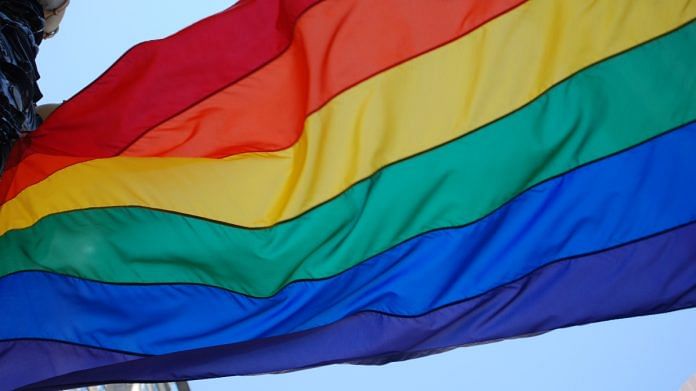New Delhi: On Tuesday, a special anti-terror tribunal in Bangladesh sentenced six Islamist militants to death, for brutally killing two LGBTQ+ rights activists in 2016.
The militants, belonging to the Ansar al-Islam, an affiliate of the al-Qaeda in the Indian Subcontinent (AQIS), had used machetes to hack Xulhaz Mannan (35) and Mahbub Rabby Tonoy (26) to death on 25 April 2016. The killers, posing as courier service personnel, had forced their way into the home of Mannan, editor of Bangladesh’s only LGBTQ+ publication Roopbaan, in the Kalabagan area of central Dhaka.
In a statement, the Ansar al-Islam said its members killed the two men because they were “pioneers of practicing and promoting homosexuality in Bangladesh”. The killings came a year after the organisation had been outlawed for a series of murders of secular intellectuals, activists and religious minorities.
Eight men were charged for the double murder of Mannan and Tonoy in July 2019, of which six were convicted and given the death penalty Tuesday. The verdict was initially scheduled for 6 April but got postponed due to a Covid lockdown declared by the government amid a surge in cases.
Judge Mohammad Majibur Rahman, while pronouncing the verdict, said the death penalty was to “set an example” that “militancy or terrorism in any form” will not be tolerated in Bangladesh.
The convicts include Syed Ziaul Haque Zia, the chief of the Ansar al-Islam and a former army officer; Akram Hossain, Mohammad Mozammel Hossain alias Saimon; Mohammad Sheikh Abdullah, Arafat Rahman and Asadullah. The other two individuals charged for the crime have been acquitted. Four of the eight individuals charged with the crime had been absconding, including the two who have been acquitted, while the other four were present in person for the sentencing.
ThePrint looks back at the murders and what they meant for the LGBTQ+ community in Bangladesh.
Also read: How al-Qaeda outpaced ISIS in Bangladesh by tuning into youth anger & conservatism
‘The machete killers’
The Ansar al-Islam had earned infamy for a spate of crimes in 2016 that came to be known as the ‘machete killings’ — the group used to carry machetes or crude homemade firearms and kill those who didn’t agree with their views on Islam.
Only two days before the Mannan-Tonoy double murder, Rezaul Karim Siddique (58), a professor of English, was stabbed to death in the north-western city of Rajshahi. A month before, atheist blogger Nazimuddin Samad (28) was murdered near Jagannath University in Dhaka.
In all, Ansar al-Islam was believed to have killed or injured more than 50 people in Bangladesh, with most of the crimes taking place in broad daylight.
However, in the Mannan-Tonoy double murder case, charges were pressed against the eight suspects only in 2019 by the Counter-Terrorism and Transnational Crime (CTTC) unit. The trial began on 19 November 2020. The CTTC had taken over the probe in 2017 from the Detective Branch (DB).
The investigation into the double murder picked up pace after the group’s operational wing member Asadullah was arrested. He confessed to the killing and revealed that a former army major, Syed Ziaul Haque Zia, was the mastermind behind the attack. Zia had been on the run since he was kicked out of the army, after he was accused of being involved in a failed coup against Prime Minister Sheikh Hasina’s government in 2011.
Asadullah also revealed how the accused prayed at a mosque near Mannan’s apartment before sneaking into the building to execute him, slashing and injuring the security guard in the process.
A movement silenced
Mannan had founded Roopbaan in 2014 to give the country’s tiny and secretive LGBTQ+ minority a voice. He, along with his friend and associate Tonoy, had been actively involved in raising issues related to the community’s rights. Just a month before his demise, Mannan had tried to organise a “rainbow rally” in capital Dhaka, for which he was briefly detained.
Mannan also worked at the American development agency USAID, which oversaw humanitarian aid abroad, for about 9 years. The news of Mannan’s death had shocked American officials in Bangladesh, and many of them had expressed condolences.
Marcia Bernicat, the US ambassador to Bangladesh, had said she was devastated by the murders, and urged the government in the “strongest terms” to apprehend the criminals behind the “senseless act of violence”.
State Department spokesperson John Kirby had also condemned Mannan’s death, describing him as a “beloved member of the embassy family and a courageous advocate” for gay rights.
For the LGBTQ+ community in Bangladesh, the murders changed everything overnight. Thousands of queer people lived in constant fear, which effectively killed the movement for their rights.
Bangladesh PM Sheikh Hasina had accused her political opponents, the Bangladesh Nationalist Party and the fundamentalist Jamaat-e-Islami, of orchestrating the attacks. She said they were trying to “destabilise the country” by committing heinous acts. However, the opposition parties had termed the allegations “ridiculous and unfortunate”, questioning how she had reached this a conclusion without a proper investigation.
(Edited by Shreyas Sharma)
Also read: Why fewer Indians have joined ISIS



